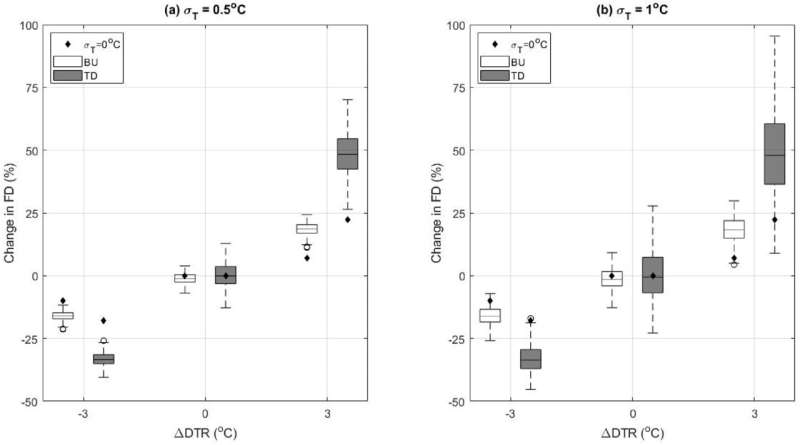Climate change creates complications for concrete


Distribution of variation in fatigue damage relative to current climate for different climate change scenarios assuming standard deviations of (a) 0.5 °C and (b) 1 °C for surface 250 mm thick road in Phoenix, AZ. Credit: Results in Engineering (In 2022). DOI: 10.1016 / j.rineng.2022.100736
Pennsylvania motorists know the effects the weather can have on paved roads — potholes, cracks, and other pavement woes are common. Climate change is accelerating this process, with devastating consequences for infrastructure.
Concrete is said to be able to withstand high temperatures better than asphalt. However, new research led by Lev Khazanovich, Anthony Gill Chair Professor of Civil and environmental engineering at the University of Pittsburgh Swanson School of Engineering, found that to be not entirely true.
Article, published in the journal Results in Engineeringfound that while concrete pavements are unaffected by increases in mean air temperature, they are extremely sensitive to drastic changes in air temperature during the day.
In other words, as the day gets hotter and the night gets colder, the concrete pavement will be severely affected.
“Concrete roads make up less than 5% of the total roads in the United States, but they carry about 26% of the total miles traveled and far exceed their weight when it comes to driving the economy forward,” explained Khazanovich.
“Concrete doesn’t change its properties no matter how hot it gets. There is an unproven belief that this means concrete pavement is resilient. extreme temperaturebut now we know that’s not the whole picture. “
The study looked at the effects of increasing extreme heat events in both temperate and hot climates and found that concrete pavement in temperate climates would be more affected. What’s more, they found that thicker pavements are more sensitive to extreme temperatures than thinner pavements – meaning highways and major highways are most at risk.
Khazanovich worked with postdoc Sushobhan Sen and graduate student Haoran Li on this research. They explain their findings are based on the mechanics of how concrete pavements develop thermal stress, which is significantly different from asphalt pavements.
“As the climate continues to warm and temperature changes become more extreme, we will need to evolve advanced technology to address the rapidly deteriorating condition of our roads. For example, innovative concrete pavement cooling technologies, such as cool and reflective pavement, can help them better withstand extreme temperatures.
The article was published in Results in Engineering.
Sushobhan Sen et al., Effects of climate change and urban heat islands on the deterioration of concrete roads, Results in Engineering (In 2022). DOI: 10.1016 / j.rineng.2022.100736
Provided by
University of Pittsburgh
Quote: Climate change creates complications for concrete (2022, November 14) retrieved November 14, 2022 from https://techxplore.com/news/2022-11-climate-complication-concrete .html
This document is the subject for the collection of authors. Apart from any fair dealing for personal study or research purposes, no part may be reproduced without written permission. The content provided is for informational purposes only.




